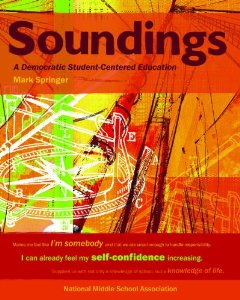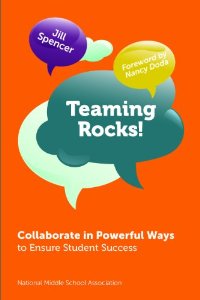Project Based Learning – References
The first step of our leap into Project Based Learning (PBL) will be to immerse ourselves in research and reading. On the bright side, there’s information galore out there, but on the dark side…. that means we have to sift through the information galore out there.
It’ll take courage know when to stop reading and just dive in. In the meantime, though, we’ve had fun uncovering some great references that our teachers will be taking a look at this summer:
- Soundings, by Mark Springer
This is a detailed look at one teacher’s successful journey into PBL. Mark Springer starts by giving very explicit information about how he puts the choice for the project into the hands of his students.
I’ve given this book to several of our teachers to read. It’s easy to get so excited about a project that we begin to take over the planning rather than leaving it to our students. We have to remember that it is not our project, but their project. No matter how cool our ideas are, we won’t have buy-in if the kids feel the project is being inflicted on them rather than chosen by them.
2. Teaming Rocks: Collaborate in Powerful Ways to Ensure Student Success by Jill Spencer
In order to do cross-curricular projects, our teachers will need to work closely together – which is not always an easy task. Hopefully this book will help us avoid some of the pitfalls of working between classes.
I heard about Teaming Rocks on the Middle Talk Google Group – an amazing group of middle school teachers who have been sharing ideas for over 10 years. Join them for wonderful professional conversations by going to https://groups.google.com/forum/#!forum/middletalk.
3. Connected Learners, A Step by Step Guide to Creating a Global Classroom by 27 students and their teacher Ann Michaelsen (Sandvika High School, Norway)
This book is inspirational: it’s the final product of an actual project created by a group of English students in Norway. It’s a clear reminder that the final product should be something real and usable (like our 10th grade history class’s documentary film on The Industrial Revolution).
4. Online sites:
- Edutopia has excellent articles about PBL and how to get started, which can be found here : http://www.edutopia.org/project-based-learning.
- Expeditionary Learning is another site full of information: http://elschools.org/.
- The Buck Institute for Education has also been putting together an impressive list of resources for teachers interested in PBL: http://www.bie.org/. Their “project search” page is wonderful. Go here to be inspired by projects that other schools have put together: http://www.bie.org/project_search.
- You can also find many articles on my Pinterest page – go to my board dedicated to Project Based Learning: http://pinterest.com/carlameyrink/project-based-learning/.




Leave a comment